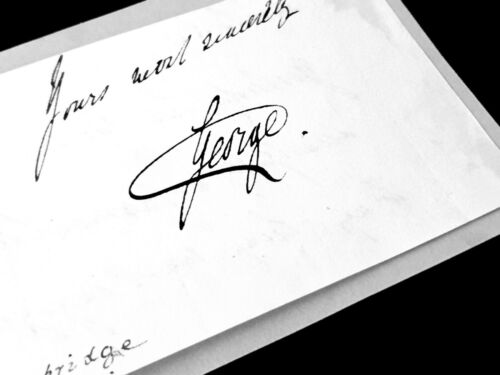-40%
Royal Prince George Duke Cambridge Queen Victoria Signed Document Cut Signature
$ 52.77
- Description
- Size Guide
Description
For your consideration is a royal manuscript cut signature/ autograph from a military commission appointment document / order / decree / edict hand-signed by HRH Prince George,Commander-in-Chief of the Armed Forces, Duke of Cambridge under Queen Victoria of England, c.1840. Original and authentic. Measures approximately 4.5" x 3.0". Mounted on card. Beautiful manuscript signature!
Prince George, Duke of Cambridge, (George William Frederick Charles; 26 March 1819 – 17 March 1904) was a member of the British Royal Family, a male-line grandson of King George III, cousin of Queen Victoria, and maternal uncle of Queen Mary, consort of King George V. The Duke was an army officer by profession and served as Commander-in-Chief of the Forces (military head of the British Army) from 1856 to 1895. He became Duke of Cambridge in 1850 and field marshal in 1862. Deeply devoted to the old Army, he worked with Queen Victoria to defeat or minimise every reform proposal, such as setting up a general staff. His Army became a moribund and stagnant institution, lagging far behind the French Army and the German Army. Its weaknesses were dramatically revealed by the poor organisation at the start of the Second Boer War.
Prince George was born at Cambridge House in Hanover, Germany. His father was Prince Adolphus, Duke of Cambridge, the 10th child and seventh son of King George III and Charlotte of Mecklenburg-Strelitz. His mother was the Duchess of Cambridge (née Princess Augusta of Hesse-Kassel).
He was baptised at Cambridge House on 11 May 1819, by the Reverend John Sanford, his father's Domestic Chaplain. His godparents were the Prince Regent (represented by the Duke of Clarence and St Andrews), the Duke of Clarence and St Andrews (represented by the 4th Earl of Mayo) and the Dowager Queen of Württemberg (represented by the Countess of Mayo).
Prince George of Cambridge was educated in Hanover and from 1830 in England by the Rev. J. R. Wood, a canon of Worcester Cathedral. Like his father, he embarked upon a military career initially becoming a colonel in the Hanoverian Army and then, on 3 November 1837, becoming a brevet colonel in the British Army. He was attached to the staff at Gibraltar from October 1838 to April 1839. After serving in Ireland with the 12th Royal Lancers (Prince of Wales's), he was appointed substantive lieutenant-colonel of the 8th Light Dragoons on 15 April 1842 and colonel of the 17th Lancers on 25 April 1842.
From 1843 to 1845, he served as a colonel on the staff in the Ionian islands, then was promoted Major-General on 7 May 1845. He succeeded to his father's titles of Duke of Cambridge, Earl of Tipperary, and Baron Culloden on 8 July 1850.
The storm in Balaklava Bay on 14 November 1854, during which HRH was on board the steam frigate HMS Retribution
The Duke of Cambridge became Inspector of the Cavalry in 1852. In February 1854, at an early stage in the Crimean War, he received command of the 1st Division (Guards and Highland brigades) of the British army in the East. On 19 June 1854, he was promoted to the rank of lieutenant-general.
He was present at the battles of the Alma, Balaclava and Inkerman, and at the siege of Sevastopol.




















